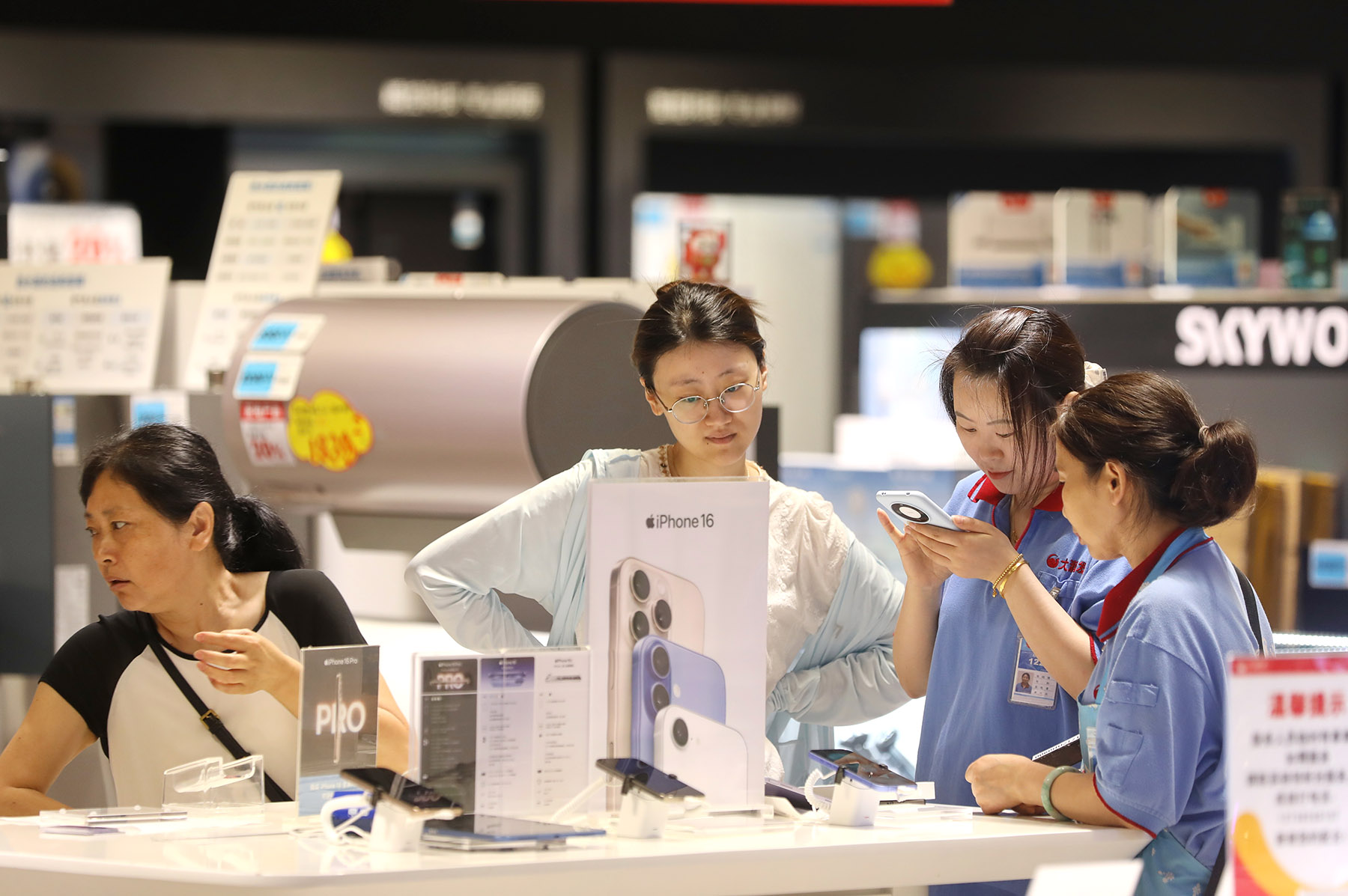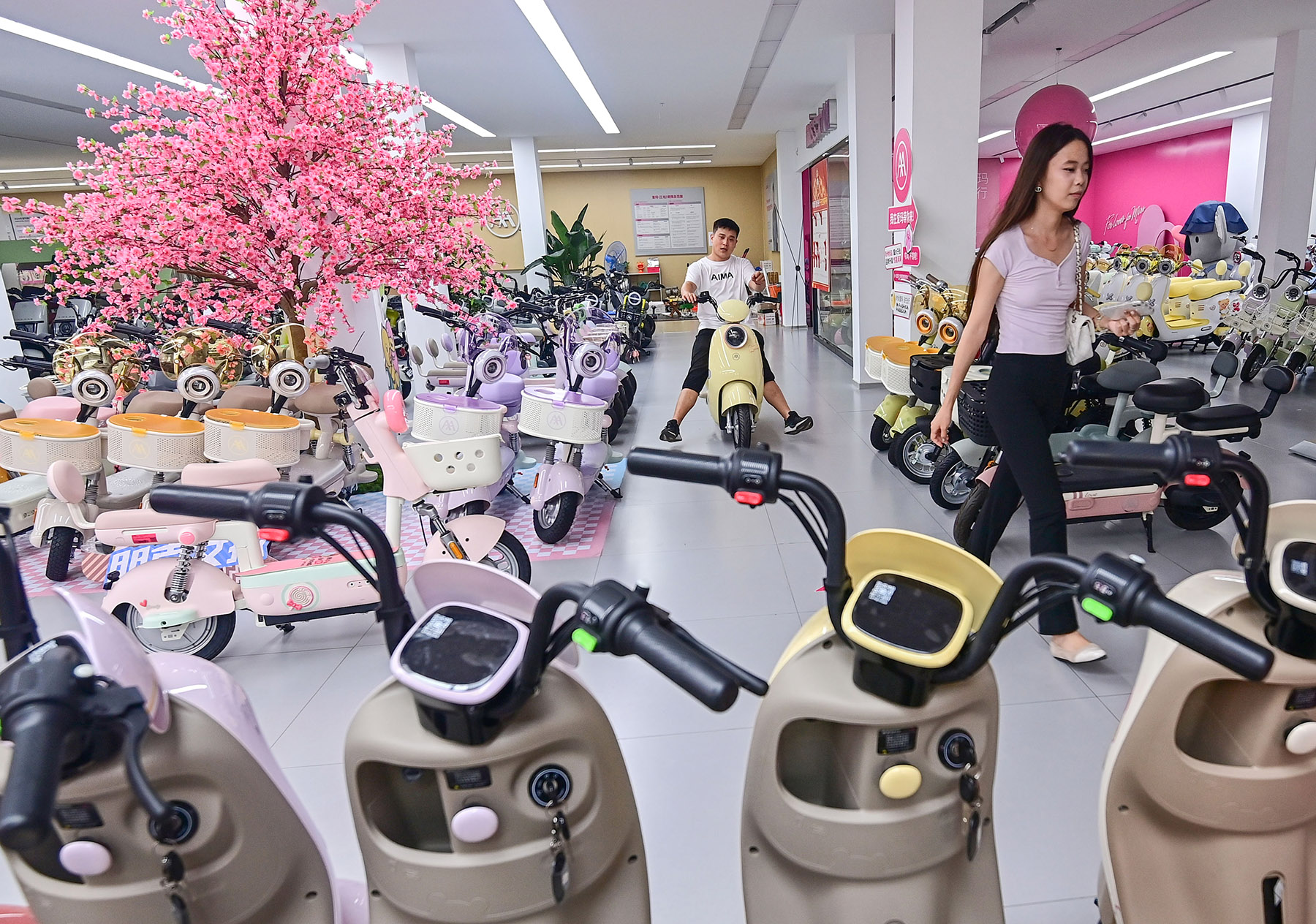Survey looks at how those born between 2000 and 2009 choose to spend their money

Spending just 1,500 yuan ($210) per month on rent, but happily going on a seven-day trip that costs 10,000 yuan, is an example of the current consumption value of the post-00s generation, or those born between the years 2000 and 2009.
"Life is all about adventures and experiences. That is why I would usually save money and spend it on something essential or on a novel experience," said Qi Qi, a 23-year-old college student in Beijing.
What is behind this consumption behavior is this generation's attitude to life. A study has found that college students are more pragmatic in the face of consumerism. When they buy something, they emphasize the value for money, while also pursuing emotional value by paying for tangible experiences. Even in terms of loving relationships, half of the post-00s choose to go with fate.
READ MORE: Evolving trends of nation's Gen Z shoppers
Based on a survey among over 600 post-00s respondents, Workplace Human Laboratory, an online market information platform, found that post-00s who grew up in a society with material abundance are often perceived as the most willing to spend money, but this is actually a misconception.
The survey on post-00s' consumption trends noticed that this generation pursues cost performance; while for emotional consumption, they value the experience itself; and for future consumption, they pursue long-term payoff.
"This is the common result of the influence of environmental factors when growing up, the economic climate and social media on the consumption patterns of the new generation. The discussion group, namely 'I love near-expiry food' on the online review platform Douban, surpassed 110,000, while leftover blind boxes are broadcast by online celebrities. Before purchasing items, they would search for shopping experiences on lifestyle platform Xiaohongshu, or RedNote, to avoid paying for IQ tax. These are typical qualities for young people," said the report.
When asked of their consumption attitude, those who only purchase what they need without considering extra functions and packaging amounted to 48 percent, while post-00s who pursue the lowest price and highest cost performance totaled 25 percent. Those who pay for "the best quality" and "brand story" only amounted to 22 percent and 6 percent, respectively, according to the survey.
Zhao Zhe, a 22-year-old student in Beijing, said: "I value cost performance and whether the item is durable. To get a better price, I often look for experience sharing on Xiaohongshu and compare goods."
For college students, value for money is the key. Products with hollow brand stories and a lack of practical value support will find it difficult to win a wide market among college students, experts said.
Looking at different regions, respondents that pursue fashionable products from first-tier cities including Beijing and Shanghai took up a larger share, compared to those from second and third-tier cities, who tend to go for pragmatism. However, in the eastern coastal province of Zhejiang, college students are also good at budgeting.
"Under the consumption value of pragmatism, post-00s generation are not giving up their pursuit of emotional value. Young people tend to chase real emotional value, instead of grand, void narrative consumption," said the report of Workplace Human Laboratory.

When asked about what kind of emotional consumption they would like to have, 84 percent chose tourism — ranking first as the favored way of emotional consumption, followed by 67 percent who chose hobbies such as playing instruments, sports and photography, while 38 percent selected offline experiences such as murder mystery games, escape rooms and live house.
"I love tourism and going to concerts. I spend generously on those things, as I think I can buy happiness," Zhao said.
Chen Yang, a 23-year-old student in Beijing, agreed, saying: "I emphasize the spiritual world and pay less attention to material consumption. Growth in quality of life is a long journey, which requires one to discover more and spend more."
In terms of love consumption, 43 percent of surveyed couples choose to take turns to pay, such as one pays for dinner while the other pays for milk teas; while 30 percent pay for themselves, and only 11 percent put their money together to spend.
According to the Workplace Human Laboratory report, 54 percent of post-00s spend 500 yuan to 1,000 yuan on love-related consumption per month, while those spending between 1,000 yuan and 2,000 yuan accounted for 21 percent.
In addition, the survey highlights that daily necessities of post-00s have already become high-tech, with smartphones, laptops, tablets, smartwatches and electric bicycles topping college students' most favored intelligent consumer goods.
"In the past, bicycles were a symbol of university life, but now, bicycles in universities are increasingly replaced by electric bicycles. For schools with large campus areas and scattered teaching buildings, electric bicycles are much more convenient and labor-saving," said the report of Workplace Human Laboratory.
"E-bicycles have wide usage scenarios in universities. Whether for getting to a morning class, going across campus for an event or inviting friends for an outing, e-bicycles are a nice choice. Young consumers are used to having intelligent products around them and e-bicycles belong to that category," said the spokesperson of the e-bicycle department of robotics technology company Segway-Ninebot.
In addition, the survey found that post-00s consumers are especially willing to pay for virtual services, with 71 percent paying for software memberships.
Data from Zhihu, a leading Q&A-inspired online content community in China, showed that by June, its monthly subscription users totaled 13.2 million, among which the largest proportion are users from Yanyan Story, a sub brand. Its user profile in 2022 showed that its post-00s users surpassed 70 percent.
"Young users are basically students and young office clerks, and their consumption on content demonstrated the characteristics of diversity, innovation and a reflection of emotion," said the spokesperson of Zhihu.
"More and more young people are willing to pay for knowledge and experiences. Lifelong learning has become a trend, and young people are willing to spend real money on high-quality content and services to meet different needs such as career advancement and hobbies.
ALSO READ: Autumn turns spotlight on China's 'emotion economy'
"Technological innovations such as artificial intelligence have made the dissemination of knowledge more efficient. With the support of AI, we can train intelligent assistants in different professional fields, serving as learning tools, productivity tools and creative tools. This kind of intelligent product, which integrates data, algorithmic computing power and contextualized experiences, has subverted the form of knowledge dissemination to a certain extent, and is believed to create a larger knowledge payment model and market space," Zhihu said.
To target post-00s consumers, Wang Peng, an associate research fellow at the Beijing Academy of Social Sciences suggested that they should understand their needs — on one hand, they should highlight the products' cost performance and practicability, and enhance user experience with technique advancement. On the other hand, they should pay attention to offering emotional values, such as developing customized products and creating immersive consumption scenarios.
"In the meantime, enterprises may take advantage of technologies such as AI and augmented reality to prioritize consumption procedure. Key opinion leaders and word of mouth may also help enhance influence. Furthermore, they may also embrace guochao (or China-chic), integrating traditional culture with modern design, and emphasizing the concept of sustainability, which conforms to the value of the post-00s generation," he said.
Liu Yang contributed to this story.
Contact the writers at zhengyiran@chinadaily.com.cn


